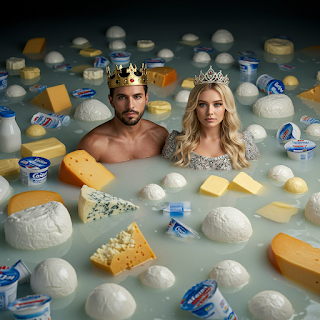The Hidden Dangers in Your Kitchen: Foods That Accelerate Aging
In this blog post, we’ll explore common foods that have been linked to premature aging and explain why these seemingly innocent ingredients might be doing more harm than good. By the end, you'll not only have a better understanding of which foods to avoid but also how to make healthier choices to preserve your youthful glow and vitality.
1. Sugar: The Sweet Villain
Sugar is one of the most notorious contributors to premature aging, and it sneaks its way into nearly every processed food item in our kitchens. From cereals to sauces and even so-called “health foods,” sugar is everywhere. When you consume too much sugar, it binds to proteins in your body through a process called glycation, forming harmful molecules known as advanced glycation end products (AGEs). These AGEs damage collagen and elastin, the proteins responsible for keeping your skin firm and supple, leading to wrinkles and sagging skin.
Excess sugar consumption is also linked to inflammation, which is a major contributor to skin aging and various chronic diseases like heart disease, diabetes, and Alzheimer's. Cutting back on sugar—especially from refined sources like candies, pastries, and sugary beverages—can do wonders for both your skin and overall health.
Healthier Alternatives
Opt for natural sweeteners like raw honey, maple syrup, or stevia in moderation. Better yet, satisfy your sweet tooth with whole fruits, which are not only naturally sweet but also packed with antioxidants that protect your skin from oxidative stress.
2. Processed Meats: A Fast Track to Aging
If you enjoy deli meats like ham, bacon, sausages, or hot dogs, it’s time to rethink these choices. Processed meats are packed with preservatives, including nitrates and nitrites, which have been linked to inflammation and oxidative stress—two significant contributors to aging. These chemicals can also impair the body’s ability to repair DNA, accelerating the aging process at the cellular level.
Moreover, the high sodium content in processed meats can lead to dehydration, which makes your skin more prone to wrinkles and a lackluster appearance. Dehydrated skin loses its elasticity over time, making fine lines and wrinkles more noticeable.
Healthier Alternatives
Instead of processed meats, consider lean, unprocessed protein sources such as skinless chicken, turkey, or plant-based proteins like lentils, chickpeas, and tofu. These foods provide the essential amino acids your body needs to maintain muscle mass and repair tissues without the added risks.
3. Refined Carbohydrates: More Than Just Empty Calories
Refined carbohydrates like white bread, pasta, and pastries may be convenient and tasty, but they come with a hefty price—accelerated aging. These foods are stripped of their fiber and nutrients, causing blood sugar spikes, which, over time, contribute to glycation and inflammation, much like sugar does. This process breaks down collagen, resulting in premature wrinkles and sagging skin.
In addition, refined carbs are often void of antioxidants, which are essential for fighting off the free radicals that contribute to aging. Regular consumption of these foods can also lead to weight gain, which has been linked to an increased risk of chronic diseases such as heart disease and diabetes.
Healthier Alternatives
Swap refined carbohydrates for whole grains like quinoa, brown rice, or whole wheat bread. These options are packed with fiber, which helps regulate blood sugar levels, and antioxidants that fight the signs of aging. Whole grains also help maintain healthy gut bacteria, which is increasingly being linked to skin health and aging.
4. Fried Foods: The Crispy Culprit
Who doesn’t love a crispy French fry or fried chicken every now and then? Unfortunately, fried foods are loaded with unhealthy trans fats and advanced glycation end products (AGEs), both of which accelerate aging. Trans fats, in particular, have been shown to increase inflammation and the risk of heart disease, as well as damage the skin’s elasticity, leading to premature aging.
Furthermore, the high temperatures used in frying food can lead to the formation of toxic compounds like acrylamide, which has been linked to cancer and oxidative stress. This oxidative stress damages skin cells, contributing to wrinkles and age spots.
Healthier Alternatives
Choose healthier cooking methods like baking, steaming, or grilling. If you crave the crunch of fried foods, try air-frying or oven-baking your food with a light coating of olive oil or avocado oil. These oils are rich in healthy fats that can help maintain the skin’s natural moisture barrier, keeping it soft and youthful.
5. Alcohol: The Dehydration Downfall
While an occasional glass of wine may have its health benefits, overindulging in alcohol can take a serious toll on your skin and overall health. Alcohol dehydrates the body, and dehydrated skin is more prone to wrinkles and fine lines. Chronic alcohol consumption also dilates blood vessels, which can lead to broken capillaries and a ruddy complexion.
Alcohol also increases inflammation in the body, exacerbating conditions like acne, rosacea, and other skin issues. Plus, alcohol interferes with your liver’s ability to detoxify the body, leading to a buildup of toxins that can further age your skin and internal organs.
Healthier Alternatives
Instead of alcohol, opt for hydrating beverages like herbal teas, infused water, or sparkling water with a splash of fresh citrus. These drinks not only keep you hydrated but also provide antioxidants that help fight oxidative stress. If you do drink alcohol, moderation is key—stick to one drink per day for women and two for men.
6. Dairy: The Controversial Aging Accelerator
Dairy is a tricky subject when it comes to aging. While it's a good source of calcium and vitamin D, which are important for bone health, dairy can also contribute to inflammation and skin problems in some people. Many adults are lactose intolerant or have difficulty digesting dairy, leading to bloating, inflammation, and even acne, which can age your skin.
Moreover, some studies have linked dairy consumption to an increase in insulin-like growth factor 1 (IGF-1), a hormone that can accelerate the aging process by promoting inflammation and the breakdown of collagen.
Healthier Alternatives
If you suspect dairy is causing inflammation or skin issues, try eliminating it for a few weeks and see how your body responds. There are plenty of dairy-free alternatives available, including almond milk, oat milk, and coconut yogurt, which can provide similar textures and flavors without the potential side effects.
7. Salt: The Skin-Drying Saboteur
While our bodies need sodium to function, too much salt can lead to water retention and puffiness, particularly around the eyes. Over time, a diet high in salt can dehydrate your skin, making it appear dull and more prone to wrinkles. In addition, excessive salt intake is linked to high blood pressure, which can damage blood vessels and reduce the skin's ability to get enough oxygen and nutrients, speeding up the aging process.
Healthier Alternatives
Cut back on processed foods, which are often loaded with hidden sodium. Instead, season your meals with herbs and spices like turmeric, cumin, or rosemary, which not only add flavor but also provide anti-inflammatory benefits. If you’re craving a salty kick, try sea salt in moderation, as it contains trace minerals that can be beneficial for your skin and overall health.
8. Artificial Sweeteners: A False Friend
You might think you're doing your body a favor by choosing diet sodas or low-calorie snacks made with artificial sweeteners, but the reality is that these substitutes can have their own set of aging consequences. Some artificial sweeteners, like aspartame, have been linked to increased oxidative stress and inflammation in the body—two key drivers of aging.
Moreover, artificial sweeteners can disrupt your gut microbiome, which plays a crucial role in everything from digestion to skin health. A compromised gut microbiome has been linked to a variety of chronic conditions, including premature aging.
Healthier Alternatives
If you're looking to reduce your sugar intake, opt for natural sweeteners like stevia, monk fruit, or a small amount of raw honey. These alternatives provide sweetness without the potential harmful effects of artificial sweeteners.
9. Caffeine: The Hidden Dehydrator
Caffeine, especially in large amounts, can be a major dehydrator. Whether it's from coffee, tea, or energy drinks, excessive caffeine consumption can dry out your skin, making wrinkles and fine lines more noticeable. It can also interfere with your sleep patterns, and poor sleep is directly linked to accelerated aging, as your skin does most of its repair work while you're asleep.
Moreover, caffeine can trigger the production of cortisol, the stress hormone, which breaks down collagen and leads to skin thinning over time.
Healthier Alternatives
If you’re not ready to give up caffeine entirely, try reducing your intake and switching to green tea, which contains less caffeine and is loaded with antioxidants like EGCG that fight aging. Hydrating throughout the day with water is also essential to counteract caffeine’s dehydrating effects.
10. Fast Food: The Ultimate Aging Offender
Fast food is the epitome of convenience, but it’s also packed with unhealthy fats, sugar, salt, and processed ingredients that all contribute to accelerated aging. The high levels of trans fats, refined carbs, and sodium in fast food not only wreak havoc on your skin but also contribute to chronic inflammation and oxidative stress, both of which speed up the aging process.
Eating fast food regularly can lead to weight gain, which is a risk factor for numerous age-related diseases, including heart disease, diabetes, and certain cancers.
Healthier Alternatives
To avoid the pitfalls of fast food, try preparing quick, healthy meals at home. Keep your kitchen stocked with fresh vegetables, lean proteins, and whole grains so you can whip up a nutritious meal in no time. Meal prepping can also be a lifesaver for those busy days when you're tempted to grab fast food.
Conclusion: Take Control of Your Aging Process
Aging is a natural process, but by being mindful of what we eat, we can significantly slow down the visible and invisible signs of aging. The foods in your kitchen play a crucial role in how you look and feel as you age. By cutting back on sugar, refined carbs, processed meats, and other culprits of premature aging, and replacing them with nutrient-dense, anti-inflammatory options, you can preserve your youthful appearance and vitality.
Remember, it’s not about perfection but about making healthier choices consistently. Your future self will thank you for the small changes you make today. Keep your kitchen stocked with wholesome, fresh ingredients, and you'll not only look younger but feel better from the inside out.











Comments
Post a Comment